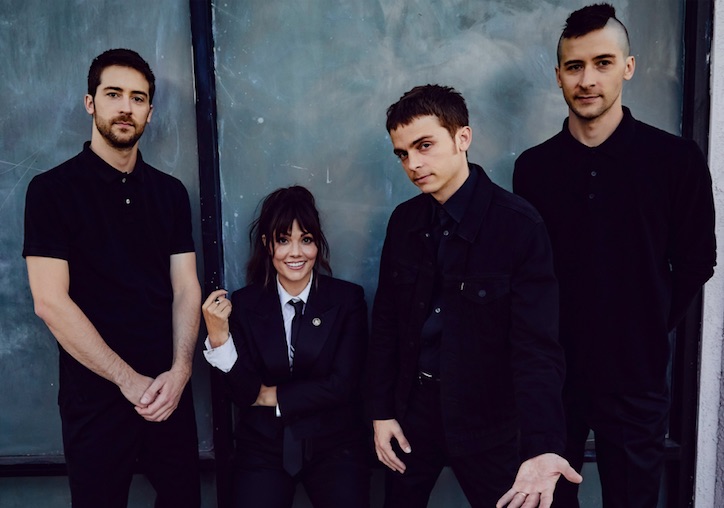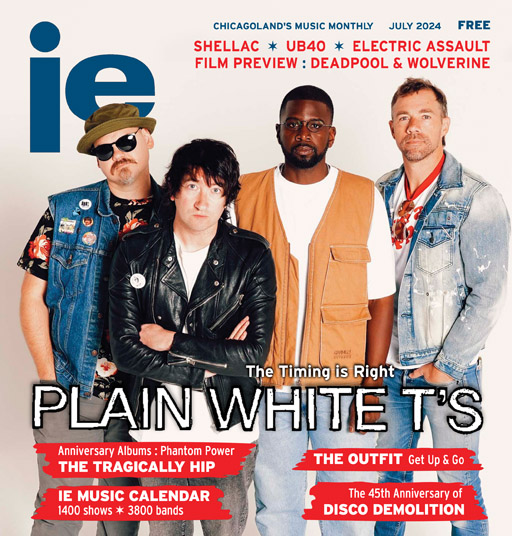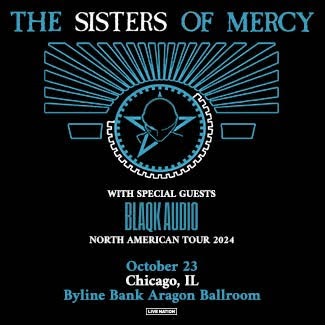Cover Story: The Interrupters • Write Your Own Story
Looks, they say, can be deceiving. Hearing energetic vocalist Aimee Interrupter ricochet through In the Wild — the bracing new fourth album from The Interrupters, the SoCal ska-punk outfit she formed 11 years ago with dub-schooled guitarist Kevin Bivona, now her husband — it’s difficult to picture anything but unbridled joy and optimism fueling it. From its coliseum-rousing opening anthem “Anything Was Better” through Clash-jagged power-chorders like “As We Live,” “The Hard Way,” and “Worst For Me,” plus a Gospel-passionate “Burdens,” an Ennio Morricone-exotic “Let ‘Em Go,” and the more traditional reggae foray “Kiss the Ground” — the feel-good collection feels unusually inspired as if the band members were sipping refreshing cocktails on some sunny Caribbean beach between studio takes. The truth, unfortunately, was much darker than that.
When the claustrophobic coronavirus hit, it tested the faith, tenacity, and emotional endurance of just about everyone around the globe. Now, as ebullient efforts like In the Wild appear as if by magic, two years on — and The Interrupters are able to hit the touring trail again to back it (with Interrupter, nee Allen) pinballing across stages in her Rosie-the-Riveter, We-can-do-it, do-rag bandanna — many might have forgotten just how terrifying those uncertain early months of 2020 were. Not this vexed vocalist. When lockdown kicked in, she had already sunk to a personal rock bottom. And she had nowhere else to go but up.
“I’ve struggled with a major depressive disorder for most of my life,” confesses the Montana-bred Interrupter. Gradually, she says, she had come to accept that it was simply incurable and a burden she would be saddled with forever. “And I’d tried everything, every kind, every kind of antidepressant to help me, and I just never could get better. And as a lyricist, I really wasn’t able to dive too deep into my own story or be too vulnerable because it was kind of scary for me when I was already going through all these things and suffering so much.” The arrival of Covid, of course, made finding a medical solution something of an existential imperative.
As what she now jokingly refers to as a “hail-Mary, last-ditch effort,” she opted to try TMS Therapy, or Transcranial Magnetic Stimulation, a noninvasive new treatment that required no surgery or even the application of electrodes. And granted, the half-helmet patients wear does look a little like Clockwork Orange, but the equipment houses a magnetic coil which, when placed against the forehead, delivers a magnetic pulse that stimulates the nerve cells in brain regions involved in mood control and depression. The desired result is the sparking to life of these areas that typically lay dormant during depression. Sure, it might sound — or even look crazy. But don’t knock it, sighs a now-anguish-free Interrupter — TMS, or rTMS, with ‘r’ emphasizing the repetitive nature of the prescribed stimulations — actually worked.
“I just decided to do this therapy during the pandemic,” says the singer. Initially, each day she went in for TMS, she had to numerically rate how she was feeling, from one to ten, with ten being the most depressed. For a while, it looked fruitless. “Every single day for weeks, I was 10 — 10, 10, 10, 10,” she recalls. “And then, after several more weeks of therapy, that number gradually came down to a nine, eight, seven, and then on my last day of therapy, I was a two. And I have happily stayed at two ever since then.” She didn’t see the unexpected creative bonus TMS would provide: “It gave me the strength, the emotional ability, and the safe space to be able to write my story and to be able to look at some of the darker things in my life that I wasn’t able to look at before — it was honestly too scary and too hard to write my own story and to delve too deep into it. And that’s the biggest difference between this record and other music I’ve done — I’m in a mentally healthier place, more than I’ve ever been before.”
Again, shiny rock’s steady surface appearances will contrast greatly with what’s lurking right beneath, lyrically, on In The Wild, and you’d better brace for impact.
The composer pulls no autobiographical punches. “It took me two years to write this song? I wanted it perfect,” she sings on “In the Mirror,” by way of introduction, and her rejoinder to the title mentioned in “Anything Was Better” is “than where I was from.” And she’s not just whistling “Dixie.” “And ‘Anything’ isn’t about location as much as it is circumstances,” she clarifies. “So it’s not a specific location, although I am from Montana. And other people in Montana might have a great experience there, but my experiences and my circumstances there were really bad, so anything was better. Which was why I moved — I moved by myself to Los Angeles when I was 19 years old. I met a band in Montana when they played a little punk club, and they said, “We live in L.A., but actually they lived in Orange County, but I said, ‘I want to move to L.A. and pursue music — can I follow you guys?’” The group accepted the tagalong, and it wasn’t long before the innocent Allen became the Street-savvy Interrupter. Tiring of life behind the Orange Curtain, she high-tailed it to Los Angeles and immediately to the historic Hollywood sign because she wasn’t familiar with any other landmarks. As she stared down at the metropolis, she would one day conquer, she phoned her punk-club bartender buddy back home and asked if he knew any potential contacts in town. Kismet.
“There was this movie called A River Runs Through It that was filmed in my hometown, and the bartender was an extra in that movie,” Interrupter notes. “And he was like, ‘Actually, I do know somebody! And they might even have a room for rent!’ And the place that had the room for rent?” She gets chills just thinking of the spooky synchronicity of it all. “I was parked on that same exact street, so I just walked over and knocked on the door! And they did have a room, and that’s how it all started — I started walking up and down Sunset Boulevard, looking for musicians, and ultimately, that led me to The Interrupters.” This was 2009 when she met guitarist/producer Kevin Bivona and his bandmate brothers, bassist Justin and drummer Jesse, who were then touring as The Telecasters, and two years later began collaborating on punk-powered material with them. The matchup clicked and caught the ear of Rancid founder Tim Armstrong — himself one of the most sorely underrated composers on the scene — who employed the quartet on his ongoing Tim Timebomb recording project, then signed The Interrupters to his uber-hip Hellcat imprint through Epitaph for its eponymous 2014 debut.
“But for me, music was what brought us together,” Bivona recounts. “Aimee was touring a solo record, and I had a band, and we just ended up on this West coast tour together, and I just loved her songs so much that we literally exchanged numbers right away and started texting each other about songwriting. Like, ‘We’ve gotta write songs together!’ Or, ‘We’ve gotta get together and write songs!’ So within a year, we were, but then it turned into more than that because she was my soulmate. And everything that we’ve built, musically, has been built on this love and respect that we have for each other.”
They weren’t following some glossy, stadium-pleasing No Doubt trajectory, either — guided by the Bivona clan’s, abiding respect for all things ska, dub, reggae, and rock steady; they delved deeper and deeper into the Kingston sound until they perfected their own uniquely scruffy and true-blue take on it, easily audible on In the Wild, which boasts studio cameos from serious players like Hepcat (“Burdens”), UK’s The Skints, Rhoda Dakar from The Bodysnatchers (“As We Live”), and old chum Armstrong (also on “As We Live”). Kevin Bivona’s ear has grown so highly attuned to the classic Leslie ‘King’ Kong approach that he produced the generous 14-track set himself in The Interrupters’ private studio. He wasn’t planning on making a musical backdrop for his wife’s cathartic confessional during a pandemic. But as he recollects, he just didn’t have much of a choice.
“When we were in lockdown, and these songs started materializing, we kind of realized that we didn’t know when the world was gonna open back up again,” says Bivona. “And Aimee and I live together, and my brothers, the twins, live together on the same property, and we have this studio on our property that was our practice room, but we converted it into a recording studio, and we got right to work. And out of necessity, I became the producer because I was the one who built the studio.” He first began cutting records for musicians at 14, he says. Like most punk rockers worth their ska-smart salt, he first got into reggae via the definitive soundtrack to Roger Corman’s classic Jamaican blaxploitation flick The Harder They Come (wherein the ‘Yeah, mon’ patois was so dense, it required North American subtitles), which introduced countless young rockers to artists like Jimmy Cliff, The Melodians, and the late Toots Hibbert of Toots and the Maytals. “So I’ve always listened to music with an extra third ear, listening to the recording itself and the production, and then finding out what gear they used or why I loved this certain sound. So when it came to incorporating dub into our music, I kind of already had the toolbox. And the Jimmy Cliff record that Tim Armstrong produced? I mixed that, and it was a spiritual experience every day of that recording process. Just being able to spend time with Jimmy Cliff — one of my heroes — **and Tim Armstrong, another one of my heroes, and then watching him produce Jimmy, who was also one of **his heroes, was amazing and an incredible learning experience.”
“And I sang on it, as well — background vocals — which was one of the greatest honors of my life,” his wife pipes in proudly. And it’s no mean feat to harmonize with Cliff, who — ever since his breakthrough ‘60s smash “Hurricane Hattie”— has been one of reggae’s most remarkable, soul-stirring voices, the Sam Cooke of the bustling ska set. But Interrupter’s whiskey-tough warble has become a hurricane-velocity force of its own In the Wild, owing in part to the new diary-direct honesty that her new post-TMS two score has allowed into her formerly tumultuous existence, which she likens to the hardscrabble existence of a feral child in the chugging rocker “Raised By Wolves.” (“I was the youngest of four, my mom was a single mother, and it definitely felt like I raised myself — I didn’t have any stable parental figures,” she explains.) But tapping into that new vulnerability made all the difference, her spouse reckons. To sonically couch her catharsis, The Interrupters recorded days, nights, lay afternoons — any time she felt a reminiscence beaming through, however painful it might be. “And we have a studio in our backyard, so if that happened to be at 3:00 in the morning, well, guess what? I’m making a pot of coffee at 2:00 a.m., and we’re recording at 3:00 a.m.! If we weren’t feeling it, we weren’t feeling it. But if Aimee said, ‘I **really feel like doing this song now, we were able to do it.”
Interrupter is lyrically fearless now. On bravely confronts death — of various friends and family members over the years on “Love Never Dies,” admits that she herself is the ‘Alien’ in the symphonic ballad of the same name, and subliminally inserts a lot of her personal philosophy within zen-like koans such as “Let ‘Em Go, “ “The Hard Way, “ and “Kiss the Ground,” until she’s confident enough to dismiss a detractor with a snide-snarling “You’re just another raindrop in the puddle of my pain” descriptor. How does she stay hovering at a calm, collected two, even on a Covid-era tour? Wearing her Interrupters bandanna onstage helps, she admits. “It keeps my hair in place when I’m running and jumping and sweating,” she laughs. “But I love that it’s also a tip of the hat to Rosie the Riveter, too. But I do a lot for my depression, a lot of spiritual, physical, and mental work because I put mental health as my top priority in my life — brain health. I make sure that I pick the right vitamins and food for my brain. And I make sure if I’m feeling panic attacks coming on or any anxiety, that I do breathing exercises or I pray, or I’ll go for a walk. There are a lot of things in my tool kit, things that I do. But I just try and manage it the best that I can.”
The artist isn’t recommending any one religion over another. She’s far more spiritual, she explains. “So whatever you think makes the sun rise every day, whatever that source is for you — that’s what we’re trying to tap into.” Does Interrupter believe that she’s lived before? Experienced a past life or two, perhaps? She considers this for a minute.” I would like to think I was Joan of Arc,” she decides. “I went to a psychic one time when I was about 19, and the psychic said, ‘you were Joan of Arc in a past life.’ So I’m gonna go with it.”
“I definitely feel like I knew Aimee in the past — we have a real soul connection,” Bivona adds, with aw-shucks warmth. And he hails from a famous entertainment family — his father was a trumpet player and a fellow recording engineer, and his grandfather was a big-band musician who backed everyone from Frank Sinatra to Ella Fitzgerald and even the fabled MGM orchestra.
“Yeah, we probably did have a connection,” his wife responds with a wry, warmth-canceling cackle. “I was Joan of Arc, and you were one of my soldiers!”
Where’s a drummer when you need one?
-Tom Lanham
Category: Cover Story, Featured











